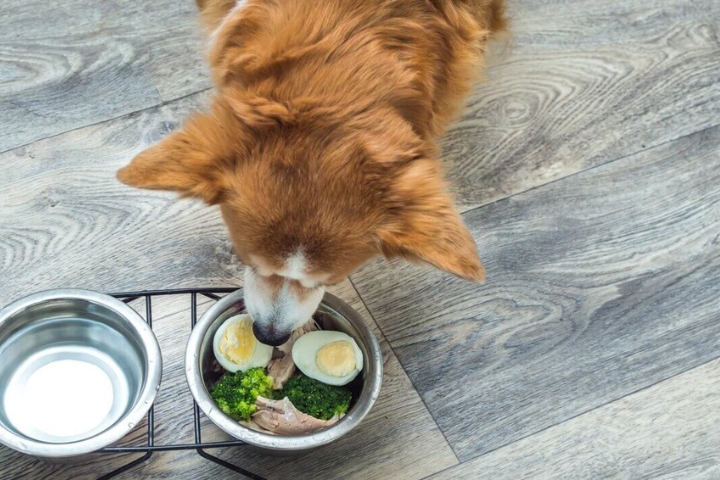As a dog owner, you may often find yourself wondering, “Can dogs eat eggs?” This question arises frequently, especially when you’re enjoying a hearty breakfast and your furry friend is giving you those pleading eyes. The good news is that yes, dogs can eat eggs! However, there are important considerations to keep in mind regarding how to prepare them and how often to include them in your dog’s diet. In this blog, we will discuss the nutritional benefits of eggs for dogs, potential risks, and the best ways to serve them.
Can Dogs Eat Eggs? The Nutritional Benefits
So, can dogs eat eggs? Absolutely! Eggs are a fantastic source of protein, essential fatty acids, and vitamins. They contain high-quality protein that helps maintain your dog’s muscle mass and overall health. According to the American Kennel Club, eggs are rich in vitamin A, vitamin B12, riboflavin, and folate—all of which contribute to your dog’s well-being.
- Protein Powerhouse: One of the primary reasons many pet owners ask, “Can dogs eat eggs?” is due to their high protein content. Eggs provide a complete protein source that contains all the essential amino acids your dog needs for growth and maintenance.
- Healthy Fats: Eggs also contain healthy fats that are beneficial for your dog’s skin and coat. Linoleic acid found in egg yolks promotes a shiny coat and healthy skin.
- Vitamins and Minerals: In addition to protein and fats, eggs are loaded with vitamins and minerals that support various bodily functions. Vitamin A helps with vision and immune function, while vitamin B12 is crucial for nerve function and red blood cell formation.
How to Safely Feed Eggs to Your Dog
Now that we’ve established that yes, dogs can eat eggs, it’s essential to know how to prepare them safely. The best way to serve eggs to your dog is by cooking them thoroughly. Raw or undercooked eggs can pose health risks due to potential salmonella contamination.
Cooking Methods
- Hard-Boiled Eggs: One of the safest ways to serve eggs is by hard-boiling them. Simply boil the eggs until they are fully cooked, then peel and chop them into small pieces before serving.
- Scrambled Eggs: Scrambled eggs can also be a tasty treat for your dog. Just make sure to cook them plain—avoid adding milk, butter, or any seasoning that could upset your dog’s stomach.
- Poached Eggs: Poached eggs are another excellent option. They retain most of their nutrients while being easy for your dog to digest.
Serving Size
When considering how many eggs you can feed your dog, moderation is key. While it’s safe for dogs to enjoy eggs as an occasional treat, they should not replace their regular meals. As a general guideline, one egg per day is suitable for larger dogs, while smaller breeds may only need half an egg.
Potential Risks of Feeding Eggs to Dogs
While the answer to “Can dogs eat eggs?” is mostly positive, there are some risks associated with feeding them too frequently or improperly:
- Salmonella Risk: Raw or undercooked eggs can carry salmonella bacteria, which can lead to serious gastrointestinal issues in both dogs and humans. Always ensure that any eggs given to your dog are fully cooked.
- Biotin Deficiency: Regularly feeding raw egg whites can lead to a biotin deficiency due to avidin—a protein found in egg whites that inhibits biotin absorption. This is another reason why cooking the eggs is crucial.
- Weight Gain: Eggs are calorie-dense; therefore, if overfed, they can contribute to weight gain in dogs. It’s important to consider the overall caloric intake when adding treats like eggs into their diet.
- Allergies: Some dogs may have allergies or sensitivities to eggs. If you’re introducing eggs into your dog’s diet for the first time, start with small amounts and monitor for any adverse reactions like itching or gastrointestinal upset.
Conclusion: Enjoying Eggs Responsibly
In conclusion, the answer to “Can dogs eat eggs?” is yes! When cooked properly and served in moderation, eggs can be a nutritious addition to your dog’s diet that provides numerous health benefits. They offer high-quality protein and essential nutrients that support overall health.
However, always prioritize safety by avoiding raw or undercooked eggs and being mindful of portion sizes based on your dog’s size and dietary needs. If you’re ever unsure about introducing new foods into your dog’s diet—including eggs—consulting with your veterinarian is always a good practice.




GIPHY App Key not set. Please check settings